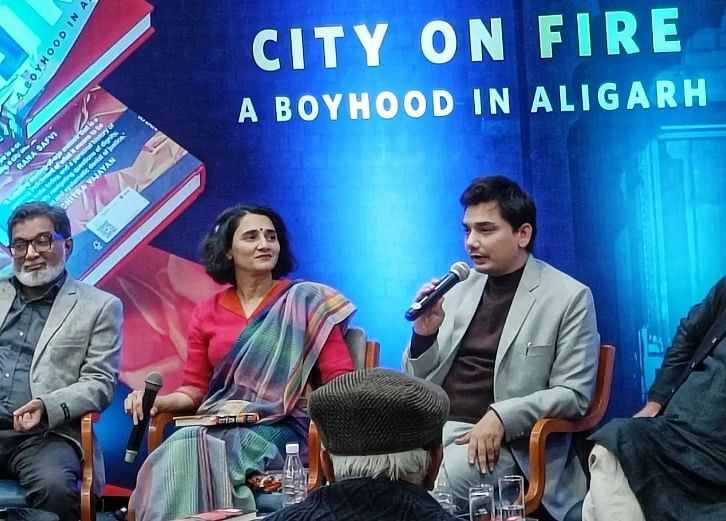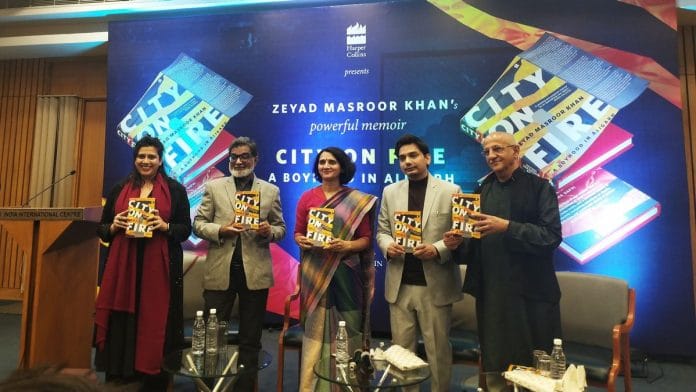New Delhi: Aligarh is often romanticised for its association with poets and intellectuals, but the city assumes a much darker hue through the lens of journalist and author Zeyad Masroor Khan. His memoir, City on Fire: A Boyhood in Aligarh, is a hard-hitting portrayal of a young Muslim growing up amid the looming threat of communal violence, bloodthirsty mobs, and the haunting fear of losing family members.
Last Saturday, the launch event for Khan’s book at Delhi’s India International Centre (IIC) drew a crowd of journalists, activists, and others drawn by the promise of insight into Islamophobia, Muslim identity, and resistance in cities like Aligarh. Also present at the gathering were several prominent activists and writers, including Harsh Mander, Ziya Us Salam, and Natasha Badhwar.
As Khan recounted his childhood memories of riots, words like “communal violence”, “ghettoisation”, and “fear” resonated throughout the hall. He also delved into the societal narrative that pits the “Good Muslim” against the “Evil Muslim”, as well as its impact on people’s lives and their struggle for acceptance and belonging.
“They are just like you. They are not enemies. We deserve respect as citizens of this country… I do deserve a government hospital, school, and bank in my area,” Khan said.
Also Read: Who robbed India’s tribes of language, livelihood? Not Vedas, Upanishads, but British laws
‘Could be the story of any young, Muslim man…’
The memoir unfolds as a “fascinating” account of growing up in an underprivileged neighbourhood in Aligarh, and how a series of riots impacted and shaped the individuals involved, according to Mander.
Khan, at four, saw the Babri Masjid riots; at 14, the impact of the Gujarat 2002 riots in Aligarh; and then, as an adult, the 2020 Delhi riots.
“It is an extraordinary book. It’s an extraordinarily beautiful and extraordinarily painful book at the same time. It’s funny and entertaining too,” Mander said, addressing the gathering.
Recalling the events of mid-December 2019, during the Anti-Citizenship Amendment Act (CAA) and National Register of Citizens (NRC) protests, Mander emphasised the relevance of Khan’s memoir today. The book, he said, serves as a timely commentary on the experience of being a young Muslim during a period when the country is transforming into a land marked by “fear”.
Journalist Ziya Us Salam, speaking at the event, reflected on the significance of Khan’s voice in a society deeply divided into “we and they”. He also cited a previous anthologised essay by Khan on how Shaheen Bagh became a symbol of dialogue and solidarity during the anti-CAA protests.

Ziya contended that writing impactfully about the Muslim experience in ghettoised localities requires both “simplicity of expression” and “strength of character”, especially in an environment where the entire community is branded as criminal.
In discussing the complexities of identity, it is essential to consider how historical narratives shape the Muslim experience in India. The ongoing discourse around reconciliation and the need for a unified understanding of history can provide a pathway for addressing contemporary issues faced by the community.
“It is a very engaging book,” Ziya, the author of Being Muslim in Hindu India, told ThePrint. “It starts like a thriller but it sets down to relate the social features around us. Technically, it’s Khan’s story but it could be the story of any young Muslim man growing up in north India in the ‘80s, ‘90s, and even today.”
Natasha Badhwar, describing the book as a “master class in writing”, also stressed its relatability and ability to reel in and hold readers with its fast pace. “Who’s interested in your story? Why should anyone want to read about someone else’s life?” she asked. “But a well-written memoir has the power to resonate with your own experiences. And that’s precisely what this book achieves.”
Also Read: Twinkle Khanna is fun, fearless and 50. Her Delhi book launch was all about ladies who laugh
Beyond victims and heroes
In his memoir, Khan fearlessly explores even those aspects of his life that might paint him unfavourably, especially in a cultural climate where nuance is easily lost or ignored.
One poignant anecdote, read out by Badhwar, highlights this. When Khan was 13, just a year after 9/11, he wrestled with the stereotype equating all Muslims to terrorists like Osama bin Laden. During a school exam where he had to write about his idol, he thought hard. Knowing that most would choose Mother Teresa, he decided to write about Osama— a reflection perhaps of his adolescent attempt to make sense of complex issues. Khan— who has clarified that his views about Osama have long since changed— received good marks for his writing. However, his English teacher, Sarah, cautioned him about expressing such opinions as it could get him into trouble.
“Well, it suddenly brought you here today,” Badhwar said jokingly, and the entire hall burst into laughter.
Khan is willing to confront uncomfortable truths, even within himself, but acknowledges that he tries to avoid needlessly hurting others. “Is saying the truth problematic? Saying things no one wants to hear. If you state what is actually happening, that is seen as revolutionary. I say what I see,” he said.
Khan recounted another powerful moment from when he was a child living in Aligarh’s Upperkot locality. At just four years old, he innocently flipped a switch in his home, unaware that it was connected to an alarm that signalled the arrival of a Hindu mob in the neighbourhood. When the alarm sounded, a neighbour rushed into his house and warned him that such an action might even “lead to riots”.
But the most heartbreaking part of City on Fire, according to Mander, was Khan’s portrayal of those killed in the riots—not as statistics or victims, but as people with their own stories and identities.
Khan told ThePrint that he deliberately steered away from the narrative of “Muslim victimhood” and resisted positioning himself as a “hero”.
“Everyone wants to be a victim,” he said. “The Muslim community also has problems that should be solved. I have shown Muslims as citizens rather than victims. People should be bold enough to raise their voices.”
(Edited by Asavari Singh)






